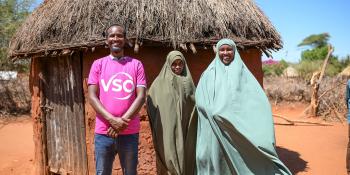Sylvester Ochieng, 28, is volunteering for a Kenya where all children have equal education opportunities. Children with hearing impairments face additional barriers to attending and making progress in school. He explains the impact he is seeing on his placement in Bungoma County.
Once I had completed my degree in early childhood education, I came to see the reality that children with disabilities face in achieving a quality education. By the time parents realise that it’s their responsibility to take these children to school, it’s too late.
So when the advertisement to volunteer with VSO on this project, I thought maybe I could help bring a change by giving the Bungoma community information on the importance of educating their children with hearing impairments.
Supporting parents and teachers
My role as volunteer involves forming parent support groups. Parents of hearing impaired (HI) children can share their challenges, and also initiate income-generating activities to help the get money to pay school fees and improve the living standards of their children.
I also help teach sign language to the parents. Before the project most parents of HI children didn’t know sign language. Before children go to school, their first teacher is the parent. They need to teach skills to prepare their children for school, to be able to socialise with others and follow instructions. But because communication between hearing impaired children and their parents is so limited, they are taken to school without acquiring many of these skills. That makes it difficult for children to adapt to school life.
By teaching parents sign language, they are able to communicate with their children at home, and to track their children’s progress at school. We also tell parents how to create a home environment that’s friendly to the child and will help them adapt quickly to the school environment.
Making a difference
I am seeing the impact of my work. At a community awareness event I ran I met one parent who took their children to school, except for their Deaf child who was left at home. He came to me and said, ‘my daughter is Deaf and can’t talk’.
I went and saw the child, and explained to the parent that because she is Deaf it doesn’t mean she can’t go to school. Being Deaf doesn’t mean she doesn’t have a bright mind.
I pushed the parent to take his daughter for an assessment, after which she was placed in the school where I am based. Now the child is in preschool nursery and is doing well.
I am teaching the father sign language so that when she is home they are able to communicate, and when he comes to the school he is able to communicate with the teacher and see how his daughter is doing. The parents are now able to communicate with their child. There is understanding at home, and the child has improved in her academic work.
Building an appetite for change
The community needs here to be sensitised on the importance of their support to the school. It will enable the community to be active participants in school management and in the education of their children through provision of learning and teaching resources. Through advocacy, they would also be able to push for the Teacher Service Commission to bring in more teachers to the school.
VSO is helping through creating awareness to the community. We’re training teachers in pedagogy and Kenyan Sign Language (KSL). After finishing college, teachers normally work in regular schools where they don’t practice their sign language skills. So by the time they are posted to special schools most of their signing is forgotten.
VSO is different because it is about actually working with volunteers to address some of these challenges that are happening in marginalised communities. These are people that have been neglected for so long, most organisations overlook them. VSO is targeting them so they can raise their living standards by themselves. It is creating a sense of independence in these people.
About the project
Community Enpowerment for Deaf Inclusion (CEDI) is a 3-year project that aims to contribute to enhanced quality of life of Deaf children, Deaf youth and their families in Kenya. The project facilitates access to quality education, creates and strengthens community support systems, advocates for a supportive policy environment, and enhances economic capacity of Deaf youth and their families. The project is delivered in partnership with Deaf Child Worldwide.
Find out more and volunteer
This World Teacher's Day, find out more about why being a teacher is the hardest job in the world.
Latest posts

The two volunteers empowering girls and young women in Mozambique
Nelma and Carmirene and are two volunteers working on VSO's EAGLE project in Mozambique. For Nelma and Carmirene, education is not just about school, it is about meeting people where they are and using the right tools to challenging harmful norms. Here are their stories.

A ripple of change: how VSO volunteers are transforming communities
Every act of volunteering begins with a choice — a decision to act out of a desire to make a difference. Across the world, VSO volunteers are proving that one spark of action can ignite something much bigger.
Opening doors to safety, education, and a brighter future
For girls in Karamoja, the poorest region in Uganda, being forced into early motherhood is all too common. This Christmas, you can open the doors to Safety, Education, and a Brighter Future.
